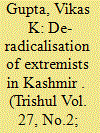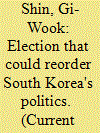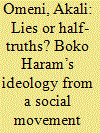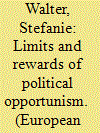| Srl | Item |
| 1 |
ID:
142363


|
|
|
| 2 |
ID:
115614


|
|
|
| 3 |
ID:
185519


|
|
|
|
|
| Summary/Abstract |
Using Social Movement Theory (SMT) as a methodological framework and explicitly employing the core SMT concepts of political opportunism and framing, this paper seeks to examine Boko Haram's use of discourse in activism. As a rarely employed research method within the Boko Haram literature, SMT holds explanatory power around the movement's approach to transforming motivation potential into actual mobilisation via frame resonance. Focusing on the application of framing within (interpreted) sermons, lectures and exhortations by both Muhammad Yusuf and Abubakar Shekau as former substantive leaders of Boko Haram, this paper unpacks the discourse of Boko Haram's ideology. The paper shows that this ideology, which contrasts the softened core of the Salafist/Wahhabi doctrines from which Boko Haram broke away, relies on problematic interpretations of Qur’ānic exegesis and political thought as both relate to faith and governance in northern Nigeria. One policy recommendation to emerge from this study is that counter-narratives to Boko Haram's ideology should highlight not just why but also how the group's rhetoric employs lies and half-truths in an attempt to rationalise its activism; despite what appears to be an adherence to Qur’ānic exegesis, in making its claims.
|
|
|
|
|
|
|
|
|
|
|
|
|
|
|
|
| 4 |
ID:
086992


|
|
|
|
|
| Publication |
2009.
|
| Summary/Abstract |
Politicians are often assumed to be opportunistic. This article examines both whether there is a limit to this opportunism and whether voters reward policy makers for opportunistic behaviour. By looking at currency crisis situations, the article presents a graphic rational opportunistic political business cycle model in which incumbents face a tradeoff between their wish to signal competence and the economic constraints imposed by the crisis. It analyses how electoral incentives affect policy makers' management of currency crises and how this management in turn affects the subsequent election outcome. The empirical results of probit models with selection using a sample of 122 crises in 48 industrial and developing countries between 1983 and 2003 confirm the model's prediction that under certain circumstances some types of policy makers do indeed have incentives to deviate from optimal policy in the run-up to elections - and that voters reward this behaviour by re-electing policy makers who follow such strategies. However, there is a limit to the readiness to manipulate: when speculative pressure is too severe, incumbents no longer manipulate policy but implement the least painful policy option instead.
|
|
|
|
|
|
|
|
|
|
|
|
|
|
|
|